National Maritime Safety Authority

The National Maritime Safety Authority (NMSA) plays a role, in Papua New Guinea (PNG) ensuring the safety, security and protection of the countrys maritime area. Established through the National Maritime Safety Authority Act 2003 NMSA functions as an entity tasked with overseeing safety regulating shipping operations and preventing marine pollution within PNGs waters.
Main Responsibilities;
Regulating Maritime Safety; NMSAs duty is to enforce safety regulations to safeguard lives at sea. This involves ensuring that all vessels in PNG waters comply with international safety standards. NMSA enforces the International Convention for the Safety of Life at Sea (SOLAS) and other relevant international maritime agreements. By setting safety guidelines NMSA aims to reduce the risk of incidents and ensure ships are equipped with necessary safety measures operated by qualified individuals.
Ship Registration and Certification; A key function of NMSA is. Certifying ships flying the PNG flag. This process includes verifying that vessels meet required safety and operational criteria before permitting them to sail. NMSA issues certificates confirming a ships seaworthiness and other necessary documentation to certify its fitness, for operation.
Ensuring the certification process is essential to uphold the integrity of PNGs industry and guarantee that all ships, in PNGs waters adhere to maritime regulations.
Port State Control (PSC); NMSA plays a role in conducting inspections on vessels arriving at PNG ports. This procedure, known as Port State Control involves verifying these ships compliance with agreements covering safety, environmental protection and labor standards. By carrying out these checks NMSA helps prevent vessels from operating in PNG waters thereby lowering the risks of incidents and environmental harm.
Marine Pollution Prevention; NMSA is also responsible for preventing and addressing pollution events. The authority enforces the International Convention for the Prevention of Pollution from Ships (MARPOL) and other applicable rules aimed at safeguarding PNGs marine ecosystem. NMSAs activities in pollution prevention include monitoring vessels to ensure compliance with waste management protocols and responding to oil spills and other marine pollution crises.
Search and Rescue Coordination; NMSA coordinates search and rescue efforts within PNGs regions. In situations like an emergency involving a vessel NMSA collaborates with other organizations to plan and carry out rescue missions ensuring the safety of individuals, at sea.
Building Capacity and Training; NMSA is dedicated to enhancing the skills and knowledge of professionals, in PNGs industry through training and educational initiatives. They offer training programs for seafarers, ship operators and other maritime workers to ensure that the sector remains competitive and safe.
Significance for PNG;
The role of NMSA is pivotal for the progress of PNG in sectors such as shipping, fisheries and oil and gas that heavily rely on efficient maritime operations. By upholding regulations and maintaining high safety standards NMSA not safeguards. The environment but also fosters sustainable growth in PNGs maritime sector.
In essence the National Maritime Safety Authority plays a role in promoting safety and protecting the environment in Papua New Guinea. Through its framework and adherence to global standards NMSA works towards ensuring safe navigation in PNG waters while preserving marine resources, for future generations.